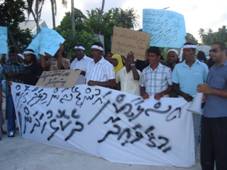The Maldivian government has written to the editor of the UK’s Telegraph newspaper seeking “clarification and apology” for a satirical article claiming that the Maldives was to be erased from the Times Comprehensive Atlas of the World as a statement on global warming.
The article, by climate skeptic James Deringpole, cited a fictitious spokesperson from Times Atlas as implying that the Maldives’ position on climate change was “a publicity stunt, cooked up by green activist Mark Lynas, to blackmail the international community into giving the Maldives more aid money while simultaneously trying to lure green Trustafarians to come and spend £1500 a night in houses on stilts with gold-plated organic recyclable eco-toilets made of rare earth minerals from China.”
In a letter to the Telegraph’s Editor, Tony Gallagher, Acting High Commissioner Ahmed Shiian wrote that “to suggest, even in satire, that the plight of our country in the face of sea-level rise is simply some kind of con-trick to raise guilt money from the international community is despicable and hurtful to all of us, whose country is indeed one of the most vulnerable on Earth to global warming.”
Shiian added that Delingpole’s “leaden attempts at humour” had already had “unfortunate political consequences in the Maldives”, after his invented quotes from a Times Atlas spokesperson “were reported as fact in the Maldives media, and the opposition party of the former dictatorship has used this to accuse the President of undermining the country and national pride.”
Minivan News yesterday contacted the publisher of the Times Atlas, HarperCollins, which confirmed that the story was bogus.
“Of course we have no plans to erase the Maldives, Tuvalu or major parts of Bangladesh from the next edition,” a spokesperson told Minivan News, also confirming that the spokesperson cited by Deringpole was not a HarperCollins employee.
“Like the rest of the piece, he is a fiction,” she said.
Major media outlets in the Maldives, including Haveeru, Miadhu and Sun Online, continued to carry the story this morning, although Haveeru had amended its version to reference “unconfirmed reports”.
The stories generated strong sentiment among the many who commented on it, with many blaming President Nasheed for the underwater cabinet meeting which had led to the Maldives “being wiped off the map”.
A senior source in the President’s Office told Minivan News that the story had stirred up strong sentiments and now the perception risked running ahead of the reality.
“It is hugely irresponsible journalism not to acknowledge when you’ve made a mistake. Standard procedure all over the world is to do a retraction,” the source said.
Editor of Sun Online and President of the Maldives Journalists Association (MJA), Ahmed Hiriga Zahir, told Minivan News that he had edited Sun’s story and was under the impression that it was genuine.
“I didn’t thoroughly check the original,” he acknowledged, “but I did read the Maldivian media. Why would the [UK] media report it [incorrectly]? I think the original media should correct it. If the Maldivian media reported it and they know it is not the truth, they should also correct it,” he added.
Press Secretary for the President, Mohamed Zuhair, said the government was approaching the Broadcasting Commission and the Maldives Media Council asking it “to insist the mainstream media be responsible, and not to take silly blogs as mainstream news.”
Zuhair said he suspected the media had “deliberately misinterpreted” the story to mislead the public and generate anti-government sentiment.
“Many of these outlets were the government organs of yesteryear, and many of their journalists have not reconciled themselves with the days when they were calling the current President a vagabond and a terrorist,” Zuhair said.
“Presenting this story as serious news is misleading, and people have been misled – they are calling up the morning radio programs concerned that the Maldives has been taken off the map. The media should be responsible and publish a retraction, but I doubt they will do it – you can wake up a person who is asleep, but you can’t wake up a person who is pretending to be asleep.”
MP for former President Maumoon Abdul Gayoom’s new political party, the Progressive Party of the Maldives (PPM) Ahmed Mahlouf, yesterday sent out a mass text message informing people of the supposed decision to erase the Maldives from the map, blaming President Mohamed Nasheed for holding the underwater cabinet meeting and ”erasing the country, erasing religion and erasing the people.”
Likes (0)Dislikes
(0)Dislikes (0)
(0) 